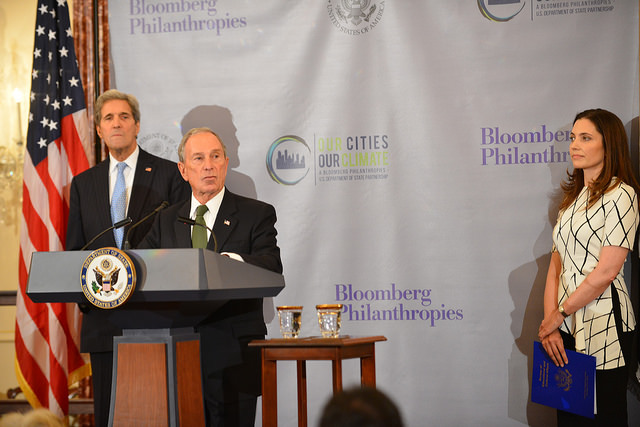
Photo: Michael-Bloomberg-John-Kerry-Evan-Ryan-addressing-climate-change
New C40 report finds cities control a third of global carbon budget
09 October 2015
by Tom Teodorczuk
C40 has published a new report forecasting that a third of the existing global carbon budget will be determined by city policymakers in the next five years.
Keeping Cities Green, a new report by C40, the global network of over 80 cities committed to tackling climate change, and the Stockholm Environment Institute, is the first to quantify the extent to which urban development decisions made by 2020 will set the course for high or low-carbon development in the long-term.
Building on research that the world can emit a carbon budget of 1,000 gigatonnes (Gt) of C02 without creating an unacceptable risk of climate change, the report estimates that two-thirds of this budget is ‘locked in’ by existing investments and policy decisions made in buildings and infrastructure.
Of the 30 percent of the carbon budget that remains unlocked, nearly a third is available to cities to address. The report concludes investing in low-carbon infrastructure in the next five years will be four times more cost-effective and less expensive than building high-carbon infrastructure now and subsequently having to replace it in the future.
“The new report conveys a hopeful message,” Seth Schultz, Director of Research at C40, told Cities Today. “Mayors hold a third of control of the remaining carbon budget and they are taking action to address this in a collaborative fashion and setting a great example on what is a global issue with global consequences.
“Mayors are the world’s great pragmatists and this report highlights the significance and importance of their ability to act.”
Mark Watts, Executive Director of C40, said: “We think this report is groundbreaking in showing just how important the city segment is relating to the remaining carbon budget. The most important people are the mayors or city leaders who are in office right now because they’ve got the chance to put us on a low-carbon pathway in a cost-effective way that they really can get society to buy into.
“If they get it wrong, it’s not all over but it will be much more expensive and more difficult to retrofit infrastructure that is high carbon with low carbon. But I take it as a big sign of hope that there are so many city leaders who get it and are working together to deliver low-carbon cities.”
Eduardo Paes, C40 Chair and Mayor of Rio de Janeiro, said: “This report provides hope for the future because it shows that we don’t just have to rely on the outcome of the critical COP21 negotiations but that mayors and city leaders in office right now have the opportunity to protect a large share of the world’s carbon budget.
“The report calculates that moving from a business as usual scenario to low carbon urban development across all the world’s cities would save 45 Gt of CO2 by 2030–equivalent to eight times the current emissions of the United States.”
C40’s new report was launched at an event in Washington DC held at the US State Department honouring international and US mayors which served as the culmination of Our Cities, Our Climate, an initiative by the US Secretary of State, John Kerry, and Michael Bloomberg, UN Secretary-General’s Special Envoy for Cities and Climate Change, to leverage the leading role cities play internationally in advancing innovative climate change action.
Michael Bloomberg, also C40 Board President, said in his State Department speech: “Cities are anxious to lead and the more they learn from one another and they borrow from one another, the more progress the world can make on climate change.”
He added: “Nobody knows how much and how fast things are happening, but let me point out 2014 was the warmest year in the history of the world. The first half of 2015 was the warmest six months in the history of the world. The month of July 2015 was the warmest month in the history of the world that we can measure.
“Something is going on out there, and sitting around and arguing about who’s responsible and whether it’s this or whether it’s that is just an outrage. We should do everything we can, and let’s hope that it’s just a short-term phenomenon, but none of us should run the risk that it’s not.”







